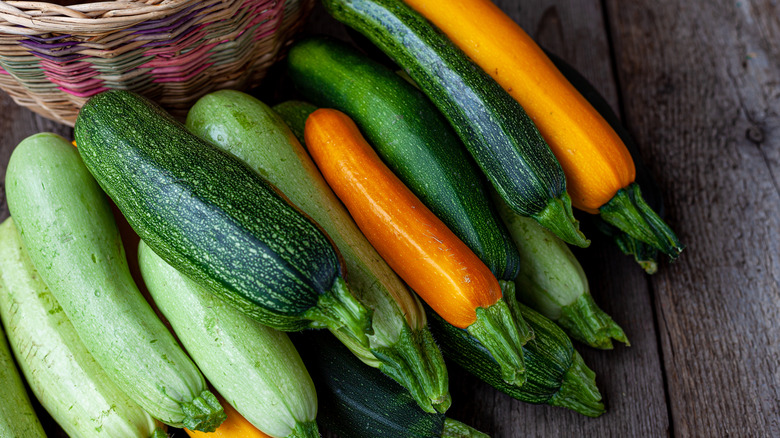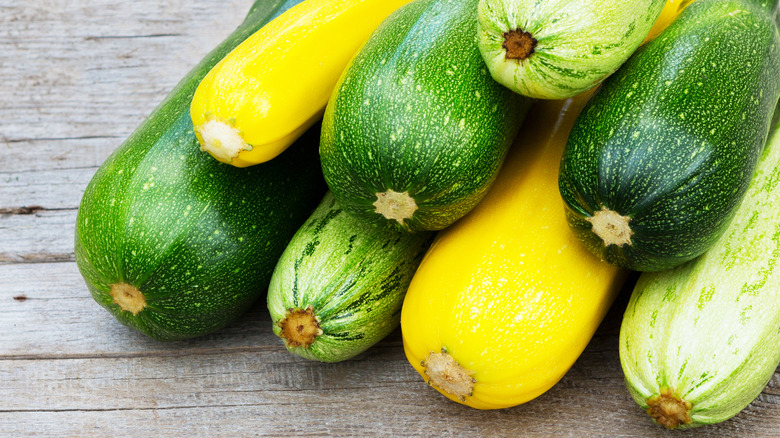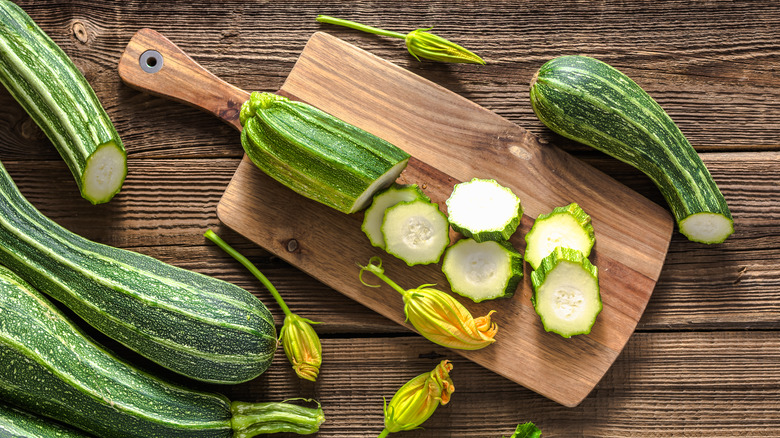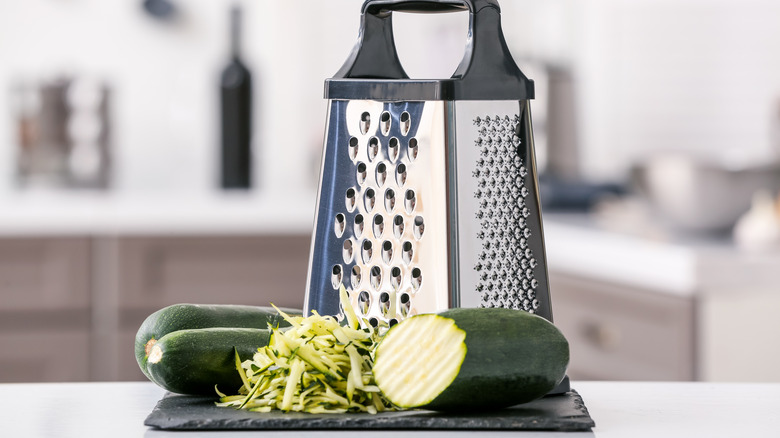The Absolute Best Ways To Store Zucchini
Abundant in warmer weather months, zucchini is a delicious and versatile squash (per University of Kentucky). However, the abundance of it during its season may leave you with more squash than you know what to do with. Luckily, storing zucchini for later is a simple process that will keep you satiated long after bringing the squash home.
Keeping zucchini fresh begins at selection, whether you're planning on eating them that day or storing them for later. The Oregonian states that you should look for zucchinis that are 6 to 8 inches long and that are still relatively thin. In addition to the squash's length and width, look for one with a slightly moist stem that is over an inch long. The skin should be bright, glossy, and somewhat spiky (via Utah State University). Also, avoid zucchini with any cuts, bruising, or blemishes (per UC San Diego School of Medicine).
Squash blossoms are also a delicious part of the plant. That said, they don't keep well in a fridge or freezer. According to Eating Expired, if you're preparing squash blossoms, plan to eat them that same day. Here are some helpful tips for when you are ready to store your zucchinis.
Fridge
Storing zucchini in the fridge is a quick and simple way to keep zucchini fresh. Following a few easy steps will ensure the texture and flavor of your zucchini stays intact. First, keep the zucchini whole until you're prepared to use it, writes Masterclass. Also, keep the skin as dry as possible. The University of Illinois states that you should avoid washing zucchini prior to storage.
MasterClass suggests storing a whole zucchini in a paper bag, allowing air to circulate and keep the squash even fresher. Then, put the bag in the crisper, ensuring an extra dry climate. Use the zucchini within 3-4 days to be on the safe side, states Does It Go Bad. If the zucchini's skin becomes wrinkled, it's time to either cook it up or freeze it to prolong its life. The only drawback of freezing zucchini is that the texture is softer. So, freezing will work splendidly for anything cooked or baked like pasta sauce or zucchini bread, but avoid using frozen zucchini for fresh recipes like salads (per AllRecipes).
Sliced in the freezer
Freezing is the best option if you won't be using your zucchini anytime soon, writes Southern Living. This method will require some effort, but properly freezing will preserve the zucchini's taste and freshness. It's best to slice your zucchini and quickly blanch the slices before freezing, (via Food Network). This process maintains the squash's texture, flavor, and nutrients since blanching slows zucchini's enzymes from aging that would otherwise continue to mature, even when frozen (per Utah State University).
Store the pieces in freezer bags after squeezing the air out (via Eating Well). You can store them in 1-2 cup portions, labeled with the amount and date for easy use. Your frozen zucchini should last up to three months (per Spruce Eats). Storing freezer-friendly recipes with zucchini in them like baked goods and soup is another excellent solution, states the Food Network, since the zucchini prevents food from drying out.
Grated in the freezer
You can easily grate raw zucchini for faster freezing and store it in freezer bags; no blanching is needed, per Almanac. The Wooden Skillet recommends placing grated zucchini on cheesecloth and squeeze out as much of the water as possible prior to freezing. So frozen grated zucchini is best in soups, sauces, and baked goods. Avoid using frozen zoodles since the moisture will make them too slimy, says Today. For zoodles, fresh zucchini is the best way to guarantee the right texture.
As you grate the zucchini, aim to use large grated pieces. Smaller grated slices will turn into a mushy pulp when you thaw them, writes The Spruce Eats. To help avoid mushy zucchini, pat the grated pieces dry as they thaw. Transfer the freezer bags to the fridge when defrosting any style of frozen zucchini. They should be ready to use in a few hours.
Now that you know how to properly store your summer zucchinis, the possibilities for their uses are endless.



